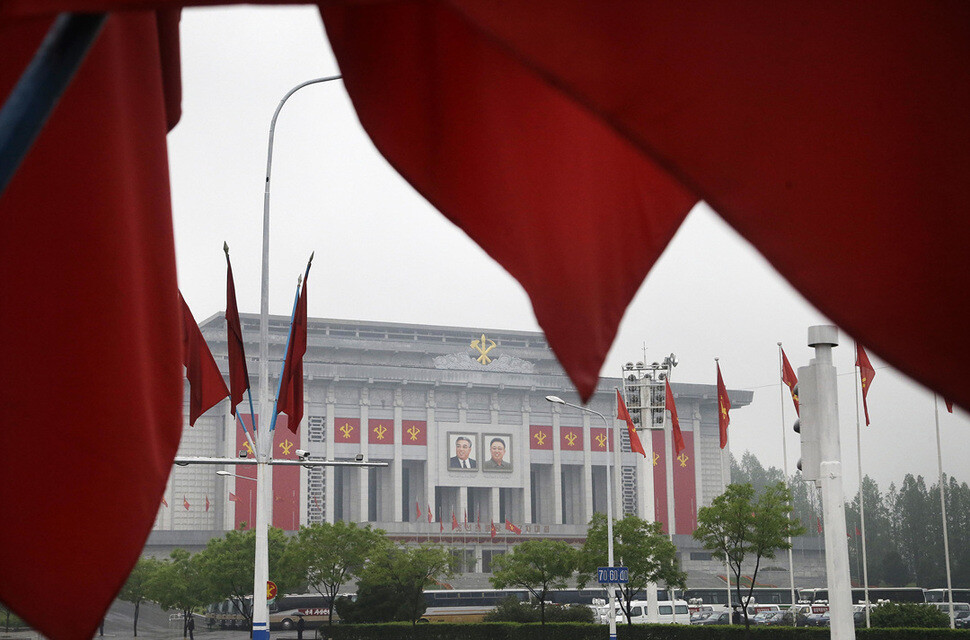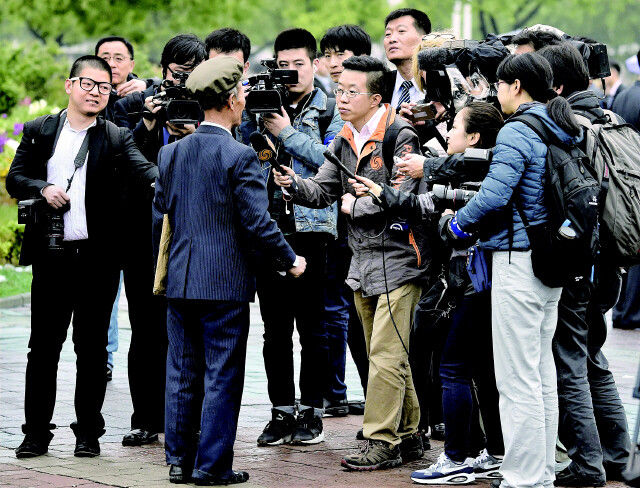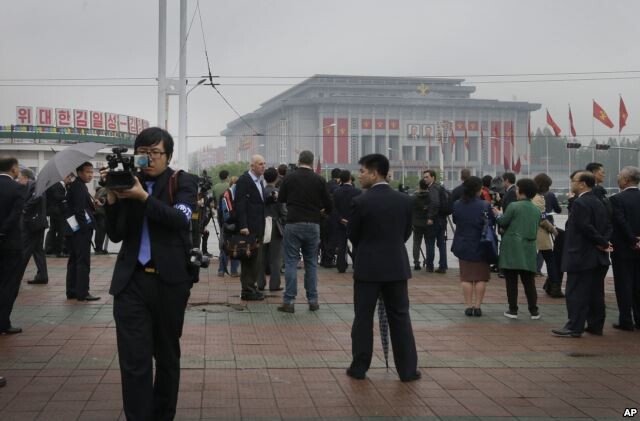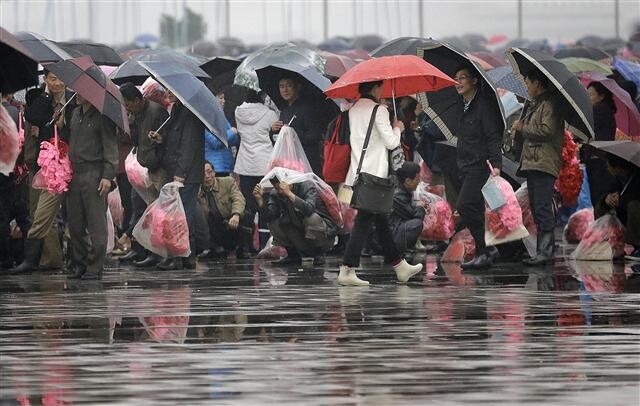hankyoreh
Links to other country sites 다른 나라 사이트 링크
Workers’ Party Congress opening “Kim Jong-un era” in North Korea

North Korea’s seventh Korean Workers’ Party (KWP) congress kicked off on May 6 amid rain in Pyongyang.
The reported location was the April 25 House of Culture. As of late afternoon, North Korean news outlets, including the Korean Central News Agency and Korean Central Television, had not reported on the event at all, let alone what had taken place there. CNN and the BBC in Pyongyang reported that the event began at 9:30 am, with North Korean officials quoted as giving an attendance of 3,000 party members, including leader Kim Jong-un.

AFP reported that foreign reporters were barred from entering the congress site and restricted to taking any photographs and film footage from a distance of 200 meters.
“The secrecy surrounding the event continues,” CNN reported, while Japan’s Kyodo News criticized the “inveiglement of around 120 journalists” who had come to Pyongyang.
In a briefing that afternoon, Chinese Foreign Ministry spokesperson Hong Lei expressed Beijing’s wish for North Korea to “achieve national development and happiness among its people,” but also for it to “heed the calls of the international community [for denuclearization] and realize peace and stability in East Asia.”

A senior South Korean government official speculated that the first day of the congress would have begun with an opening address, followed by a business summation report by the KWP Central Committee and a subsequent discussion. The key element is the business summation report, where Kim Jong-un would be personally reporting. The business summation report would include an accounting for KWP business over the 36 years since the sixth congress in Oct. 1980, along with new policy courses and aims in the areas of politics, the economy, and relations with South Korea and the rest of the world.
Based on precedent, the content of Kim’s report is expected to be printed in its entirety in the May 7 edition of the KWP’s Rodong Sinmun newspaper. During the sixth congress, then KWP general secretary, and North Korean founding leader, Kim Il-sung delivered a nearly six-hour-long opening address and business summation report on the first day of Oct. 10, with the content reprinted over 13 pages in the next day’s Rodong Sinmun.
While the North Korean government and news outlets have not disclosed the congress’s proceedings, the May 6 edition of the Rodong Sinmun gave what amounted to a preview of the discussions. An “editorial” on its front page stated that the congress would be an occasion for “the sole leadership system of the dear leader [Kim Jong-un] being firmly built on the first foothills of a new 100 years of Juche [North Korea’s official political ideology of self-reliance].”
The same editorial said the KWP was “more firmly established as an organic entity sharing the philosophy, breath, and footsteps of dear comrade Kim Jong-un and a mature and refined political staff.” The message suggests the congress will result in the “sole leadership system” under Kim becoming more firmly established, and the KWP being reorganized for the “Kim Jong-un era.”
“It is truly painful that the dignity of working class leaders has been severely harmed by traitors to the revolution in the past global socialism movement,” the Rodong Sinmun said.
“The final victory of the socialist achievement exists in the places where the revolution’s accomplishments continue to shine on through the generations,” it added.
The newspaper also declared the seventh congress to be a “meeting of victors.”
“The great victory achieved by the Workers’ Party [since the sixth congress] has been to firmly protect socialism,” it said.
“The greatest achievement of the Workers’ Party has been to gloriously carry on and develop the great ideas and feats of its leader,” it added.
According to this interpretation, the “victory” lies in the preservation of the regime and the successful passing of power from Kim Il-sung to son Kim Jong-il and grandson Kim Jong-un.
North Korea previously declared its fourth party congress in Sept. 1961 to be a “meeting of victors” after Kim Il-sung announced the elimination of the Soviet and Yanan factions from key positions in the power structure and the building of a unitary governance system.
The Rodong Sinmun also stated that the philosophical focus in terms of defining specific policy courses in different areas would be on “autonomy, military first, and socialist,” while its strategic focus would be on the three areas of “emphasizing the people, emphasizing the military, and emphasizing youth.”
“Our party has put its greatest effort into strengthening military defense capabilities to achieve the greatest height of revolutionary weapon development,” the newspaper said.

The newspaper also emphasized the “path of Songun [military first]” and “the path of two-track development [of the economy and nuclear weapons].”
The Rodong Sinmun went on to say that the “standing of our country has now changed completely, and a strong foundation has been laid for full achievement of the party’s ideals and ambitions to make the fatherland into the world’s strongest and most prosperous country.”
It also said the congress would include a “brilliant blueprint for the dazzling completion of the feat of building a strong and prosperous socialist country at the swiftest possible speed.”
According to the newspaper, the “70-day campaign of loyalty” launched ahead of the congress with a Feb. 23 decision at a meeting of the KWP Central Committee’s political bureau was “more than achieved at 144% of the plan.”
“Industrial production was 1.6 times that of the same period last year,” it noted, praising the “great victory that showed the ‘ten thousand-mile horse’ spirit of self-sufficiency and strength to all the world.”
On May 5, the presidium of the Supreme People’s Assembly referred to song “Nothing to Envy in the World” as the “eternal hymn of the leader magnificently extolling the people’s happiness” and announced an ordinance for the awarding of prizes in the names of Kim Il-sung and Kim Jong-il.
South Korea’s National Intelligence Service (NIS) predicted the congress would last three to four days.
The KWP Central Auditing Commission’s business summation reports, discussions on amendments of the party regulations, and the adoption of written decisions are expected on May 7 or 8, while the election of Central Committee members and candidate members is expected on the final day. Precedent suggests that no formal congress meeting will be held on days when ancillary events such as rallies are held.
The sixth congress, held on the 35th anniversary of the KWP’s founding in Oct. 1980, lasted for five days, with one million people gathering for a rally at Kim Il-sung Square in Pyongyang on the second day of Oct. 11 and a Mass Games event staged on the final day of Oct. 14 at the Moranbong Stadium. South Korean intelligence service reported no evidence of preparations for any large-scale rallies ahead of the seventh congress.
By Lee Je-hun, staff reporter, Yi Yong-in and Kim Oi-hyun, Washington and Beijing correspondents
Please direct questions or comments to [english@hani.co.kr]

Editorial・opinion
![[Column] Season 2 of special prosecutor probe may be coming to Korea soon [Column] Season 2 of special prosecutor probe may be coming to Korea soon](https://flexible.img.hani.co.kr/flexible/normal/500/300/imgdb/original/2024/0426/3317141030699447.jpg) [Column] Season 2 of special prosecutor probe may be coming to Korea soon
[Column] Season 2 of special prosecutor probe may be coming to Korea soon![[Column] Park Geun-hye déjà vu in Yoon Suk-yeol [Column] Park Geun-hye déjà vu in Yoon Suk-yeol](https://flexible.img.hani.co.kr/flexible/normal/500/300/imgdb/original/2024/0424/651713945113788.jpg) [Column] Park Geun-hye déjà vu in Yoon Suk-yeol
[Column] Park Geun-hye déjà vu in Yoon Suk-yeol- [Editorial] New weight of N. Korea’s nuclear threats makes dialogue all the more urgent
- [Guest essay] The real reason Korea’s new right wants to dub Rhee a founding father
- [Column] ‘Choson’: Is it time we start referring to N. Korea in its own terms?
- [Editorial] Japan’s rewriting of history with Korea has gone too far
- [Column] The president’s questionable capacity for dialogue
- [Column] Are chaebol firms just pizza pies for families to divvy up as they please?
- [Column] Has Korea, too, crossed the Rubicon on China?
- [Correspondent’s column] In Japan’s alliance with US, echoes of its past alliances with UK
Most viewed articles
- 1[Column] Season 2 of special prosecutor probe may be coming to Korea soon
- 2‘We must say no’: Seoul defense chief on Korean, USFK involvement in hypothetical Taiwan crisis
- 3No good, very bad game for Korea puts it out of Olympics for first time since 1988
- 4Is Japan about to snatch control of Line messenger from Korea’s Naver?
- 5Division commander ordered troops to enter raging flood waters before Marine died, survivor says
- 6Is N. Korea threatening to test nukes in response to possible new US-led sanctions body?
- 7Korea’s 1.3% growth in Q1 signals ‘textbook’ return to growth, says government
- 8N. Korean delegation’s trip to Iran shows how Pyongyang is leveraging ties with Moscow
- 9[Editorial] Korea’s surprise Q1 growth requires objective assessment, not blind fanfare
- 10Amnesty notes ‘erosion’ of freedom of expression in Korea in annual human rights report